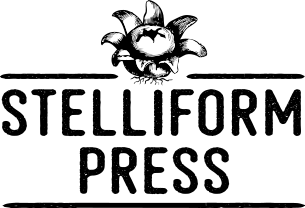Quiet Times

These are quiet times. Not like a summer evening before a storm or waking up to snow, but a fraught quiet. A waiting for an absent loved one quiet. A reading through the damage report quiet.
We are learning, if we did not know before, that there are different ways to be quiet: the quiet concentration of holding one’s breath; a silent prayer; deep breathing in the moments between acts of care-giving, or going through the now-displaced motions of our former lives. We’re not quite sure when this quiet will end.
I’ve been reading and listening to podcasts, but it’s difficult to think. Hard to reconcile big, transformative ideas into the strange quietness of this moment. But over the next few weeks, I will share some of the things I’m reading here, in case they are as helpful or inspiring or merely interesting to others as they have been to me.
Want to Stop the Next Pandemic? Start Protecting Wildlife
Eric Roston’s “Want to Stop the Next Pandemic? Start Protecting Wildlife Habitats” on Bloomberg Green focuses on the ecology of the virus. Ecologies, of course, are systems in which organisms of all kinds have a place to perform a function in connection to other organisms. It’s easy to forget that ecology spans beyond charismatic megafauna and their equally striking landscapes, or even the animals we know in our yards or neighbourhoods. Increasingly, scholars in the Humanities are imagining the boundaries of ecology to encompass human cultures and human feelings — these things influence the ways that organisms exist and interact within their systems.
Roston notes a review by the United Nations which states that “an ecological approach to disease, rather than a simplistic ‘one germ, one disease’ approach will provide a richer understanding of disease related outcomes.” This line of thinking naturally leads to the idea that the diverse biospheres in which one might encounter a novel virus should be protected in order to ensure protection from such viruses.
Let’s take this idea a step further. In order to protect ourselves from novel viruses we need to be protected from the kinds of close encounters with non-human life that leads to virus transmission. We need protection poverty. It is often poverty that drives people to seek out cheap sources of food, in markets, forests, or factory farms. We need protection from economies that demand a certain kind of work — such as logging or oil extraction or working in slaughterhouses — that we are increasingly seeing as sites of risk.
It is time to recognize all facets of human life as part of an ecological system. If local or global economies are creating interactions between organisms — human or otherwise — which are unsafe, it is time to reform that system.
The World is Changing. The World Can Change.
Our Disrupted New “Normal”
While many of us are at home — with others or alone — the world outside is changing. Under the pressure of a global pandemic, many are seeing the possibility of further change — of the ways that it becomes more possible every day to resist falling back into “normal” once quarantines and self-isolation protocols are lifted.
But many of us aren’t there yet. We can’t think about what we might do with these forced changes, these new perspectives, this undirected energy. Many of us are experiencing conflicting feelings about the ways that the coronavirus has affected daily life. We are caring for sick loved ones or fretting over their health and safety; we are in throes of anxiety over our financial situations present and future; some are grieving over the loss of loved ones and the loss of life as we knew it. We are under pressure to ignore all of this and maintain “productivity.”
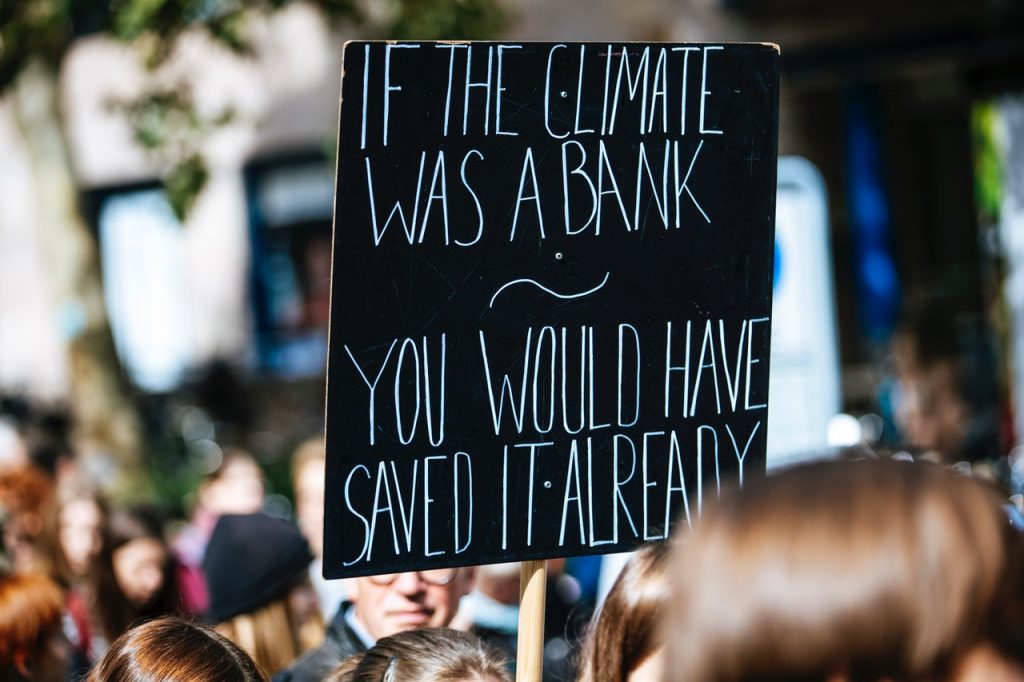
What the Pandemic Does not Teach Us
Relentless negativity in the news cycle and on social media has many of us gasping for a breath of good news, grasping at any tangible sign of positive changes in the world. Recently, stories of animals moving into the spaces recently vacated by humans have captured the attentions and imaginations of many online. Pictures of dolphins in the canals of Venice, elephants in Yunnan, China, and mountain goats in Llandudno, Wales made the rounds, provoking comments about how quick nature is to flourish in human absence.
Many of these resurgent-animal posts have turned out to be clever graphic manipulation, fakes, or just the decontextualized everyday. As Jeff VanderMeer puts it:
A good percentage of the “nature’s coming back” posts that aren’t fake are just folks who never were home during the day to know what the hell was going on in their backyard on the regular.
— Jeff VanderMeer (@jeffvandermeer) March 27, 2020
In addition to highlighting missing context, celebrating non-human resurgence can have nasty undertones. Last January, during a public talk at McMaster University entitled “My World’s on Fire, How ‘bout Yours? Unravelling the Politics and Culture of Climate Change,” professors Susie O’Brien and Robert O’Brien fielded a comment-more-than-question from an audience member who insisted that in response to the complex problem of climate change “we need a new plague.”
Well, here we are. But the Malthusian solution to environmental stress rarely considers the injustice of this answer to the question of our climate change response. Who is most exposed to coronavirus? The poor and working class who have no choice but to work if the work is available, and the homeless who cannot self-isolate. Neither does a drastic and sudden reduction in human population consider the extreme amount of human suffering that this downward trend represents. Rarely do the people making this suggestion consider themselves to be among those who succumb to their suggested plague, nor do they consider their own family and friends among the devastated survivors. This so-called solution, which comes up far more than it should, is steeped in privilege.
If we learn anything from this experience, let us learn to resist this rhetoric. Let us remember that People Aren’t Bad for the Planet–Capitalism Is. Let us continue to use our time to imagine new equitable social structures to slip into when we collectively open our doors some months from now.
Review: The Lamb Will Slaughter the Lion by Margaret Killjoy
Communing with Deer in the Era of COVID-19 and Isolation
We hope this review is reaching everyone safe, well, and suitably socially distanced. Here in Ontario we are headed for increasing Covid-19-related restrictions on the ways we engage in public spaces, with all non-essential services closing tomorrow at midnight.
I am feeling extremely lucky to live where I live — at the edge of a semi-rural development between city and conservation area. We’ve been seeing more deer lately and after reading Margaret Killjoy’s The Lamb Will Slaughter the Lion, my deer encounters trigger a little frisson of morbid excitement.
Readers, this is our chance to do what we love and model civil responsibility. If you’re looking for a new read to pass the time in self-isolation, maybe Killjoy’s novella is just what you need?
Books We Love
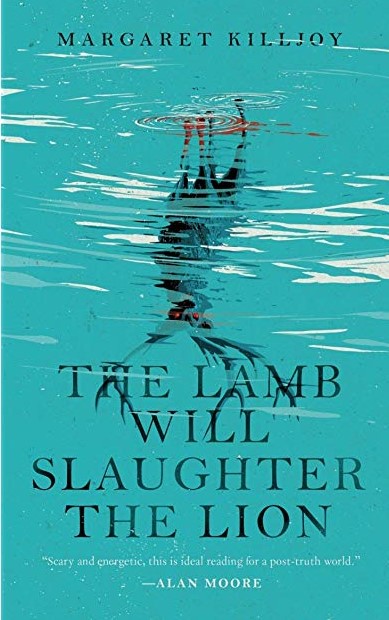
This creepy bit of sylvan horror is the kind of thing we’d like to see in our slush pile: a story about the inhabitants of an anarchist commune in Freedom, Iowa, who summon Uliksi, a blood-red three-antlered deer god, in order to deal with their hierarchy problems. Uliksi “turns predator into prey” when he “hunts those who wield power over others”.
Though Uliksi is originally summoned to deal with a violent sociopath who has seized control of the commune, the summoners soon realize that the act of summoning an “endless spirit” to dispatch Freedom’s unwanted leader results in the deer god’s gaze falling, inevitably, upon them.
We love the complex commentary on power relations in this book. Uliksi’s presence raises questions about the difference between violence enacted to seize power and that enacted in self defense, and — when the police bear down on Freedom and the squatters dread the slaughter that will ensue should Uliksi and the officers meet — the violence that upholds an unequal and oppressive society.
That this narrative about violence — and its opposites, peace, freedom, and community — takes place in an environment isolated from big cities and in which the spirit and animal realms intermingle, underscores the ways in which humankind has betrayed ecological relationship in seeking power and status.
Killjoy’s book is fundamentally about belonging. This theme is brought up again and again as animals escape their taxonomies and humans struggle against the simultaneous desire to exist in the “safe” place outside connection, and to find a place that feels like “home.” Killjoy’s conceptualization of violence is a part of this push and pull. We (especially in the West) are invited repeatedly into relationship and make the choice, again and again, to accept or deny the summons.
Announcement: Stelliform Acquires Michael J. DeLuca’s Night Roll
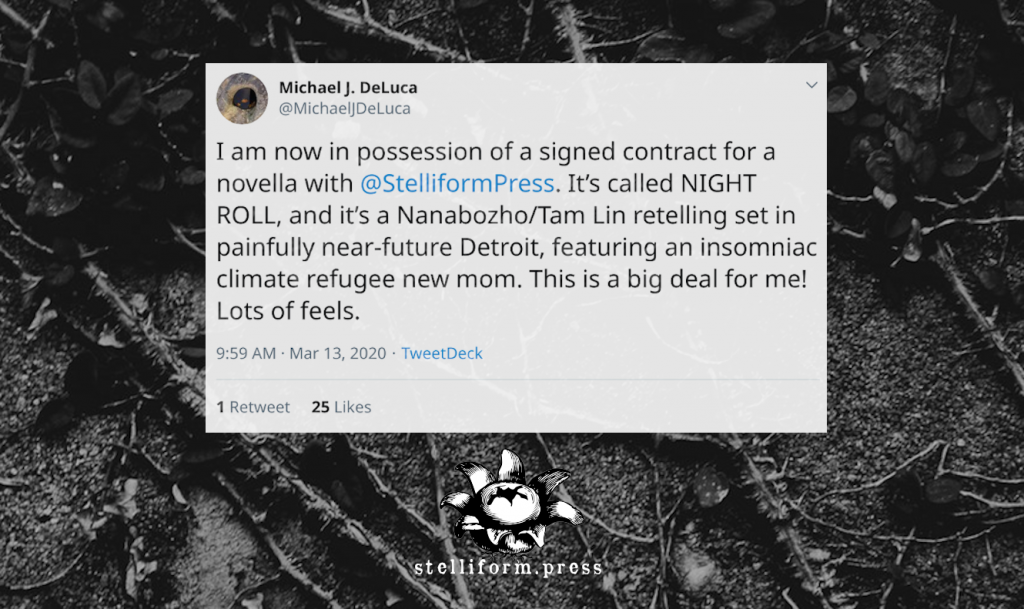
We are pleased to announce that Stelliform Press will be publishing Michael J. DeLuca’s novella, Night Roll, later this year. DeLuca is the editor-in-chief of Reckoning Magazine (which we have reviewed here and here) as well as an author of short stories published in Beneath Ceaseless Skies, Apex, Mythic Delirium, and many other places.
In Night Roll, new mother and climate refugee Aileen Dupree has been abandoned by her partner in post-industrial Detroit. Her neighbor, Virgil, comes to her rescue, bringing useful cast-offs and much needed friendship. Virgil is Aileen’s only connection to the outside world, a refuge for an insomniac newcomer who is overwhelmed by the turn her life has taken.
But then Virgil borrows Aileen’s prized possession—a chrome and leather royal blue fourteen-speed bike—and disappears. Aileen doesn’t know if Virgil’s disappearance is an accident or another abandonment.
When she ventures out to look for answers, Aileen finds friendship and support in a vibrant community she didn’t expect, surrounding a mysterious figure, the Elf: a timeless being who has always fought the colonizers and capitalists of Detroit, and who now leads Night Roll, a wild race through the city’s disintegrating streets.
It is up to Aileen to bring Virgil back to his friends and family. But what can the Elf teach her about her new life? And what must she pay for that knowledge?
Follow us on Twitter, Facebook, or Instagram for updates on Night Roll. In the coming months we will have a cover reveal, author interviews, and giveaways. If you are a reviewer of climate change related titles, contact us for an ARC.
Announcement: Stelliform Acquires Sim Kern’s Depart, Depart!
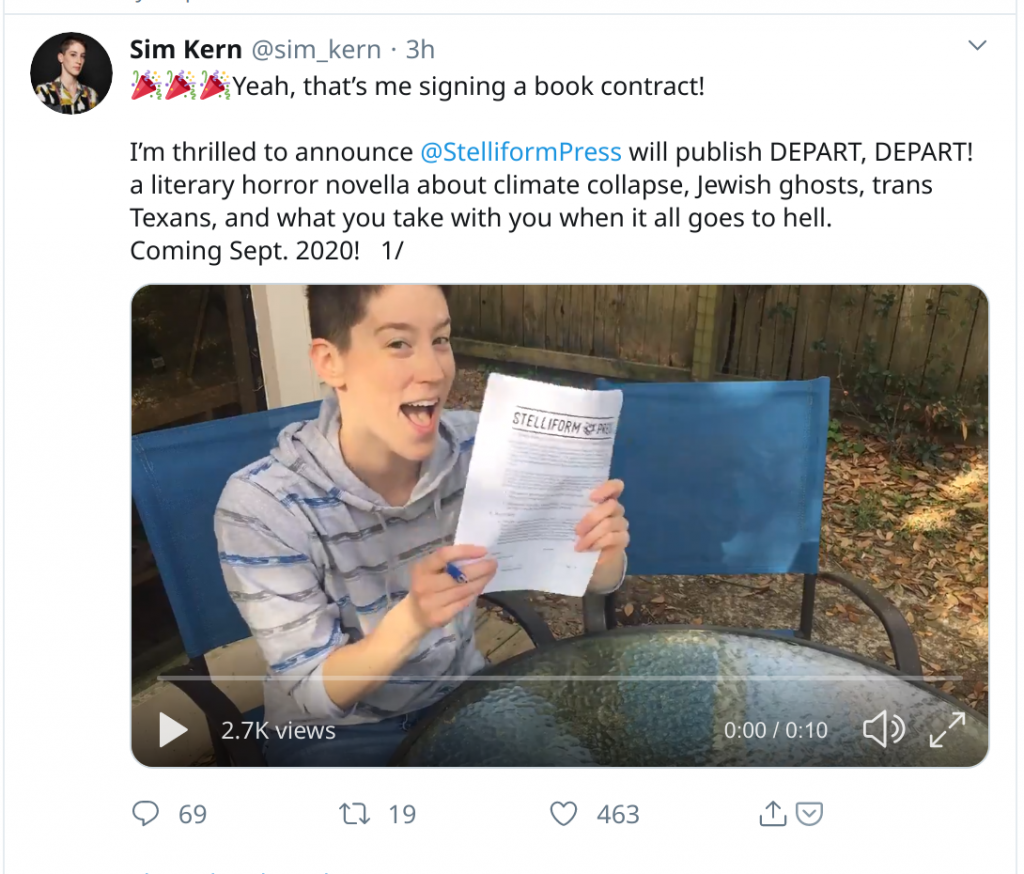
Yesterday we acquired our first novella, Sim Kern’s Depart, Depart! Kern’s book depicts the aftermath of a violent storm, and the ways in which climate change affects society’s most vulnerable people. Kern describes their novella in a series of tweets:
When an unprecedented hurricane destroys Houston, Noah finds shelter in the Dallas Maverick’s basketball stadium. To make matters worse, he keeps seeing visions of his great-grandfather Abe at the age Abe was when he fled Nazi Germany inside a duffel bag.
Noah doesn’t know if he’s haunted or hallucinating, but the visions keep saving his life and lead him to a found family of other queer refugees. But as tensions mount in the stadium, Noah fears that being trans and Jewish may put him at risk with certain “Capital-T” Texans.
To understand Abe’s visions, Noah delves into Jewish mystical lore and his own family’s intergenerational traumas. But the climate crisis is intensifying across the country, and as his shelter falls apart, Noah must decide what he’s willing to sacrifice in order to survive.
Follow us on Twitter, Facebook, or Instagram for updates on Sim Kern’s book. In the coming months we will have a cover reveal, author interviews, and giveaways. If you are a reviewer of climate change or LGBTQ+ titles, contact us for an ARC.
